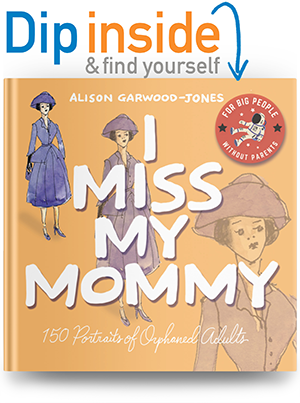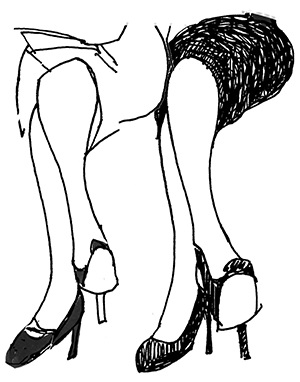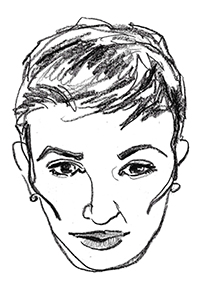Ch-ch-ch-ch-changes
November 24, 2010
Few things amaze me more than the range women’s lives have taken on in the last 100 years. It’s a real A to Z trajectory. When you think that only a century ago women were confined to corsets, shut out of universities and streamlined up the aisle. Now we’re police chiefs and bus drivers and engineers and film makers and bartenders and mothers, with or without a ring on our finger.
Few things amaze me more than the lack of range men’s lives have shown over the last 100 years. To quote Dorothy Parker, it’s a real A to B trajectory. Sorry guys, you know I’m rooting for you, but, let’s face it, you’ve been flat-lining it for centuries. Inertia is to the male nature what change is to the female.
While women were coming together and exploding social norms, you were remarkably consistent and insistent about what you expected and wanted out of life. And you got it, for a very long time. But now as more and more women go at it alone, you’re still hoping your dinner will appear in front of you at the appointed hour. And it does, only now it’s placed there by your server, not your wife.
Today the pressure is on because the gig is up. It’s your turn to upend your expectations. I know you can feel it. There are millions of female eyes boring into you. (It’s the only time we take charge of “the gaze”). “Well?” we blink? A sign of another first: for the first time in history women are defining the terms and conditions for entering into relationships. Paychecks will do that. Meanwhile, the demographics tilt even further towards singledom.
If women are unhappy about this, it’s because we’re tired. Life calls for a lot of heavy lifting, emotionally and physically. Doing it alone is hard. If men are unhappy about this, it’s because they want and need women far more than they want or know how to express it.
Few writers have described this moment in time in the male/female dance better than Brendan Tapley. His crunchy insights explain what it really means to “man up.”
Here’s an excerpt from his most recent article in the Dec/Jan issue of Bust, my favourite women’s magazine.
The most dispiriting thing I’ve observed about modern male/female relationships is the profound lack of faith women have in our ability to love them, lighten their loads, and be true partners. What’s worse: I understand why.
As women have become breadwinners, started families solo, and grown to expect their best connections to come from other women, modern masculinity has responded by narrowing itself. We men now more extremely and crudely embody masculinity’s negative traits as a way to distinguish ourselves as men. Macho overcompensation can be seen everywhere, including in our economy (self-interest on steroids), our politics (talk radio) and our sexuality (American men spend more on pornography every year than they do on movie tickets and the performing arts combined). As for being husbands and fathers, which should be noble callings, sitcoms have made buffoonery and cluelessness their hallmarks. Indeed, judging by the many (many) surveys in women’s magazines, today’s men come across as medieval. Which is why we should return to those times for a modern lesson.
Chivalry may no longer be a word that folks of our era, male and female, use. That it has become a loaded term, tarnished as chauvinistic and demeaning, is tragic. Not merely because women often lament the ways men no longer show them courtesy but because chivalry was never about women needing assistance from men; it was about men needing the awareness chivalry demands.
Chivalry emerged in medieval times because the period was coarse and the first knights were rapacious thugs. Originally a code meant to guide men on spiritual matters, one of which detailed how to honor women, chivalry aimed to change male behavior by inspiring fraternity around a higher calling, the central principle being service. Chivalry’s authors knew that the virtue of service plays a nifty trick on men: raised to believe our fulfillment is front and center, service tempers our egocentrism by actually fulfilling it. A man committing to a cause greater than himself elevates the cause and the man. (this is true whether you’re a Big Brother volunteer or Nelson Mandela).
So, my fellow men, I ask you: what better cause is there for us than women? While holding a door or standing up when being introduced may not make for epic poetry, as symbols these gestures are manifestations of a solicitude men are accused of no longer possessing. Because it is a system based on serving others, what chivalry would return to men is a discipline of conscientiousness.
Tapley is currently immersed in writing a book about masculinity. I can’t wait to read it!



























Leave a Reply